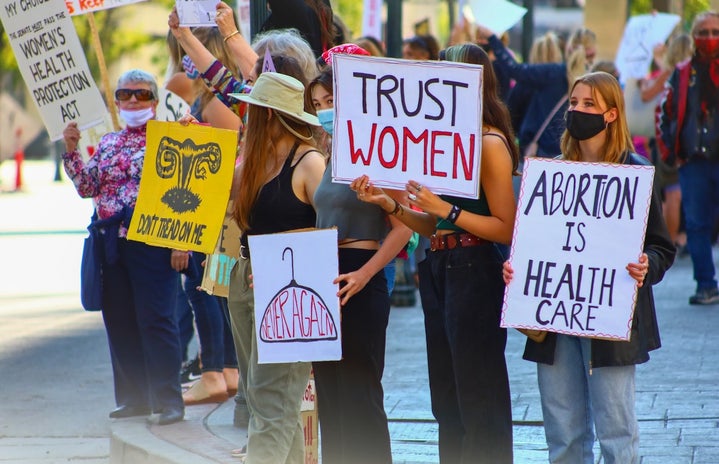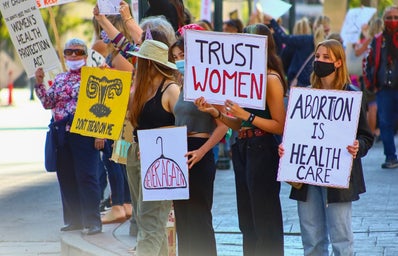Sunday 22nd January 2023 marked 50 years since the US Supreme Court ruled in favour of women across America and gave them the federal right to choose abortion. However, the landmark decision did not last, falling short of its 50th year.
Why?
In June 2022, the US Supreme Court overturned Roe v. Wade. However, let us first consider the previous May: Gallup had asked adult survey participants, ‘Do you think overturning Roe versus Wade would be a good thing or a bad thing?’ 63% of participants answered that it would be a ‘bad thing’. In the same survey, 62% of adults argued that the practice should be legal in most cases. The Centers for Disease Control and Prevention (CDC) recorded that 620,327 abortions were performed by doctors in the US in 2020, allowing that the number is likely higher as some states did not publish information and these statistics only follow abortions performed in clinical settings. Furthermore, in 1999, the, now former, President Donald Trump described himself as “very pro-choice” during an NBC News interview.
So, what changed?
In short, nothing has changed. Abortion is accepted amongst the general public and is used by women who need it. Even now, progressive states have moved to protect the access to abortion, with 10 states actually expanding access and 21 in total keeping protections in place for abortion. However, a staggering 25 states have either banned or partially banned abortion.
While attitudes in general remain pro-choice, there have been some significant changes since the Obama administration which have led to more conservative actors becoming prominent on the American political stage.
The US Supreme Court is made up of nine Justices who largely follow either liberal or conservative policy lines. The current Court is ‘packed’ to be conservative, with John G. Roberts Jr., Clarence Thomas, Samuel Alito, Neil Gorsuch, Brett Kavanaugh, and Amy Coney Barrett all aligning with more right-wing views – Roberts and Kavanaugh occasionally swinging. Opposingly, Sonia Sotomayor, Elena Kagan and Ketanji Brown Jackson follow liberal views. Supreme Court Justice appointments are for life – unless one would like to retire, at which point the sitting President may appoint his or her replacement. This gives a level of control to the President about how the Court will swing.
Roe v. Wade gave women the constitutional right to choose to have an abortion. The overturning meant that this right is no longer constitutionally protected nationally. In 1973, Justices interpreted that the Fourteenth Amendment, which prohibits states from depriving persons of life, liberty or property, covered the ‘right to privacy’ – including the qualified right of access to abortion. In June of 2022, however, Justices believed that since the Constitution makes no direct mention of abortion, it is not a constitutional right.
This argument does fall flat, as the main function of the Court is to interpret the Constitution in an ever-changing America. The US, at the time of the Constitution’s creation in 1789, was vastly different to the superpower of the 2020s – abortion was only outlawed in 1880, and only became a divisive political issue when conservative activists identified is as a potential threat to traditional values and the ‘nuclear family’ structure. These views became popular alongside opposition to gay rights, rising divorce rates, and women working outside of the home.
The Influence of Trumpism
President Donald J. Trump was able to appoint three Justices during his four-year administration (Kavanaugh, Gorsuch and Coney Barrett). The latter was the replacement for liberal Justice, Ruth Bader Ginsburg, allowing the Court to sway to the right. Justice Kavanaugh’s appointment was wrought with questions over his suitability: he was accused of sexually assaulting Professor of Psychology, Christine Blasey Ford, who testified during a Senate Judiciary Committee regarding Kavanaugh’s unsuitable nomination. Amy Coney Barrett was also a controversial appointment, as her nomination came only 38 days before the 2020 Presidential Election, plus her anti-LGBT and anti-abortionist views confirmed that her appointment would sway the court. Barrett also served as a ‘handmaid’ in the Christian group, ‘People of Praise’, drawing comparisons to Margaret Atwood’s The Handmaid’s Tale (1985), and Barrett’s willing participation in a male-dominated hierarchical organisation.
The composition of the Court was a major factor in allowing Roe v. Wade to be overturned, with five Justices voting to overturn Roe, while the three liberal judges and Chief Justice John Roberts voted against the overturning.
Trump claimed personal credit for the overturning of Roe, calling it a “great honour” that he made it possible. However, the overturning is not entirely of Trump’s own doing. He definitely set the stage with his recreation of fascism and reactionary politics, but right-wing Republicans and evangelical Christians have fought for decades to scrap Roe, Trump simply adopted their ideology to win at the ballot. He and his family have repeatedly avoided speaking out on abortion until pressured, and their views change dependent on popular opinion at the time.
50 Years of Roe
50 years of Roe v. Wade is a dark moment in history for American women. Medical providers in states that have completed banned abortion are reportedly delaying life-saving treatments due to the ban on the procedure. Women are “at death’s door” before receiving termination services. The numbers of complications in women who have miscarried are also rising, resulting in admissions to intensive care units and/or hysterectomy. There is also the fear that without safe healthcare to rely upon, many women may turn to self-managed abortion at-home, using non-FDA-approved medication to induce an abortion.
The overturning has also opened a dangerous discussion on when life begins. The Catholic Church teaches that life begins at conception, a belief that is widely held by Republican lawmakers. With this comes the rejection of contraception, which some anti-abortion advocates argue works as abortifacients, as ‘Plan B’ pills and IUDs prevent the implementation of fertilised eggs. The Constitution expressly advocates for the separation of church and state, and as such, arguments based on faith alone cannot be the main basis for revoking the right to abortion.
Medical professionals and bioethicists argue that the beginning and end of life are biological processes and cannot be defined by a single ‘event’. There is also a discussion surrounding the development/death of the brain as the defining factor in whether a ‘person’ is ‘alive’. There is no consensus on when life begins, as it is entirely subjective. Mary Ziegler, Professor at UC Davis School of Law, concurs that ‘when life begins is up to whoever is running your state – whether you agree with them or not.’
The UK Link
UK law dictates that abortion is allowed to be carried out up to 24 weeks in line with the Abortion Act 1967, and only after 24 weeks in cases where the foetus would be born with a fatal abnormality or if the mother’s life is at risk. Abortion in the UK is not actually enshrined in law. Following the overturning of Roe v. Wade, many in the UK have begun to worry that it might encourage anti-abortion sentiments in Britain.
In October 2022, MPs voted in favour of buffer zones around abortion clinics in order to prevent anti-abortion protestors harassing women entering the establishments. These tactics include handing out flyers, displaying doctored images of ‘babies’ who have been aborted, and filming/approaching users and doctors. Labour MP Stella Creasy introduced the amendment, stating that 100,000 women a year are targeted by UK-based harassment groups. The law proposed that harassing, obstructing or interfering with any woman attending an abortion clinic should become a criminal offence. It would also create buffer zones of 150 metres around clinics. The law would not limit protesting but would allow access to the clinics without fear of intimidation.
The amendment was approved by MPS by 296 votes to 110 and received cross-party support. However, the Democratic Unionist Party (DUP) specifically did not show support, and several Conservative MPs, including Sir Edward Leigh, have spoken out about the amendment, with Leigh stating that the anti-abortion harassment tries to “raise awareness about support available”, and that “we’re going to criminalise these grandmothers but so much of the Just Stop Oil people walk free.”
Additionally, following the overturning of Roe, there have been calls in the UK for abortion to be enshrined in the upcoming bill of rights. However, current Deputy Prime Minister, Dominic Raab, has doubts of the relevance of protecting abortion rights, as he believes the matter is “settled in UK law… as a conscience issue, [without] a strong case for change.” A woman in the UK can only receive an abortion if two doctors sign to consent that the woman is either at risk of her life, that the foetus would have serious abnormalities or if the woman would have permanent injury to her physical or mental health if the pregnancy were to continue. In short, abortion is not freely available and the NHS/your healthcare provider will ask for your reason for abortion. Abortion was only decriminalised in Northern Ireland in 2019, but commissioned abortion services have not been established yet, so abortion is not accessible as it is in England, Scotland and Wales.
Roe in the Future
The matter is very much not settled in the US. President Joe Biden issued a White House statement on the 50th anniversary of Roe v. Wade where he confirmed his administration’s continued dedication to providing information and access to abortion through Executive Orders and engagement with the public. More than 200 Women’s Marches took place on the anniversary across the US, with thousands taking to the streets. Biden is also urging the US Congress to pass legislation that codifies reproductive rights.
Roe v. Wade allowed women to access safe abortions no matter their state’s political alignment. One in four American women during the Roe period had an abortion at some point in their reproductive lives. Abortion gives women the freedom to have lives unencumbered by unwanted pregnancies and the entitlement to determine the course of their own lives. Roe allowed women to enter the workforce in masses, paving the way to better work and better pay, massively increasing the quality of life for millions of women. It was the dignity to choose.
There are still cogs turning in the Roe machine, but at state-level, it is now up to state legislatures to dictate women’s reproductive rights.
Written by: Emily Gee
Edited by: Ella Dayer
Sources:
‘Abortion’, https://news.gallup.com/poll/1576/abortion.aspx.
‘Abortion and your rights’, MSI UK: Reproductive Choices, https://www.msichoices.org.uk/abortion-services/abortion-and-your-rights/.
‘Abortion in Ireland and Northern Ireland’, Amnesty International, https://www.amnesty.org.uk/abortion-rights-northern-ireland-timeline.
Badshah, Nadeem, ‘MPs back plans for abortion clinic buffer zones in England and Wales’, The Guardian (2022), https://www.theguardian.com/world/2022/oct/18/mps-back-plans-for-abortion-clinic-buffer-zones-in-england-and-wales.
Biden, Jr., Joseph R., ‘A Proclamation on 50th Anniversary of the Roe v. Wade decision’, WhiteHouse.gov (2023), https://www.whitehouse.gov/briefing-room/presidential-actions/2023/01/20/a-proclamation-on-50th-anniversary-of-the-roe-v-wade-decision/.
Brown, Emma, Jon Swaine, and Michelle Boorstein, ‘Amy Coney Barrett served as a ‘handmaid’ in Christian group People of Praise’, The Washington Post (2020), https://www.washingtonpost.com/investigations/amy-coney-barrett-people-of-praise/2020/10/06/5f497d8c-0781-11eb-859b-f9c27abe638d_story.html.
Centers for Disease Control and Prevention, https://www.cdc.gov.
Donegan, Moira, ‘In a more just world, this would be the 50th anniversary of Roe v Wade’, The Guardian (2023), https://www.theguardian.com/commentisfree/2023/jan/22/roe-v-wade-abortion-rights-50th-anniversary.
Elgot, Jessica, ‘Dominic Raab says right to abortion does not need to be in bill of rights’, The Guardian (2022), https://www.theguardian.com/politics/2022/jun/29/dominic-raab-says-right-to-abortion-does-not-need-to-be-in-bill-of-rights.
Gallup, https://www.gallup.com/home.aspx.
Gopnik, Adam, ‘Calling Trump the F-Word: What matters about identifying the Trumpist line as fascist is that it is diagnostic’, The New Yorker (2022), https://www.newyorker.com/news/daily-comment/calling-trump-the-f-word.
Humanists, ‘MPs vote in favour of buffer zones to prevent abortion clinic harrassment’, Humanists UK (2022), https://humanists.uk/2022/10/18/mps-vote-in-favour-of-buffer-zones-to-prevent-abortion-clinic-harrassment/.
Ireland, Rose, ‘What does the US Supreme Court’s decision to overturn Roe v Wade mean for abortion rights in the US and beyond?’, Saunders (2022), https://www.saunders.co.uk/news/what-does-the-us-supreme-courts-decision-to-overturn-roe-v-wade-mean-for-abortion-rights-in-the-us-and-beyond-2/.
Jones, Kierra B., ‘Expanding Access and Protections in States Where Abortion is Legal’, CAP (2022), https://www.americanprogress.org/article/expanding-access-and-protections-in-states-where-abortion-is-legal/.
Kirchgaessner, Stephanie, ‘Amy Coney Barrett urged to step away from gay rights case because of faith affiliation’, The Guardian (2022), https://www.theguardian.com/law/2022/nov/21/amy-coney-barrett-people-of-praise-lgbtq-303-creative-v-elenis.
‘MPs back abortion clinic buffer zone law’, BBC News (2022), https://www.bbc.co.uk/news/uk-politics-63302710.
Observer editorial, ‘The Observer view on Donald Trump’s influence on Roe v Wade ruling.’ The Guardian (2022), https://www.theguardian.com/commentisfree/2022/jun/26/observer-view-donald-trump-influence-roe-v-wade-abortion-ban.
Oladipo, Gloria, ‘Surge in complications from unsafe abortions likely post-Roe, doctors warn’, The Guardian (2023), https://www.theguardian.com/us-news/2023/jan/30/us-unsafe-abortions-rise-doctors-warn.
‘Overview: Abortion”, NHS (2020), https://www.nhs.uk/conditions/abortion/.
Schreiber, Melody, ‘Contraception could come under fire next if Roe v Wade is overturner’, The Guardian (2022), https://www.theguardian.com/us-news/2022/may/03/roe-v-wade-birth-control.
Serino, Kenichi, ‘As states ban abortions, more people may turn to self-managed abortion care – with more legal challenges to come’, PBS (2022), https://www.pbs.org/newshour/politics/as-states-ban-abortions-more-people-turn-to-self-managed-abortion-care-with-more-legal-challenges-to-come.
Sullivan, Andy, ‘Explainer: How abortion became a divisive issue in U.S. politics’, Reuters (2022), https://www.reuters.com/world/us/how-abortion-became-divisive-issue-us-politics-2022-06-24/.
‘Trump in 1999: I am Very Pro-Choice’, NBC News (2015), https://www.nbcnews.com/meet-the-press/video/trump-in-1999-i-am-very-pro-choice-480297539914.
Varney, Sarah, ‘When does life begin? As state laws define it, science, politics and religion clash’, NPR (2022), https://www.npr.org/sections/health-shots/2022/08/27/1119684376/when-does-life-begin-as-state-laws-define-it-science-politics-and-religion-clash.
Yang, Maya, ‘Women’s marches take place across country on 50th anniversary of Roe v Wade – as it happened’, The Guardian (2023), https://www.theguardian.com/us-news/live/2023/jan/22/us-womens-marches-50th-anniversary-roe-v-wade-live.


